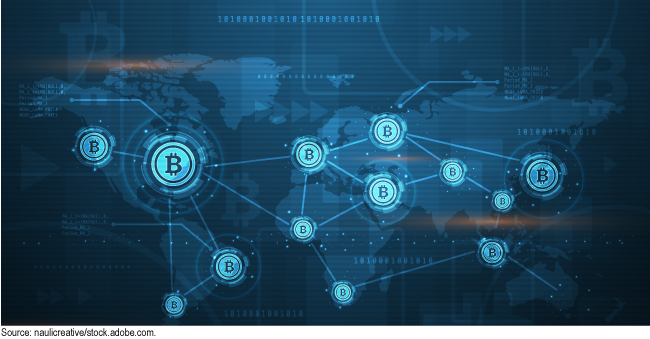Economic Sanctions: Agency Efforts Help Mitigate Some of the Risks Posed by Digital Assets

What GAO Found
Digital assets like Bitcoin and other virtual currencies pose risks to implementing and enforcing U.S. sanctions, but several factors partially mitigate these risks (see table). A key feature of digital assets is that they enable users to rapidly transfer value across countries’ borders. Yet many digital assets are recorded on a public ledger, which may enable U.S. agencies and analytics firms to trace transactions and potentially identify illicit actors. However, digital asset owners also may use the anonymizing features of some digital assets or other techniques that obscure their identities in an attempt to evade sanctions.
Selected Risks Digital Assets Pose to Sanctions Implementation and Enforcement and Factors that Help Mitigate Risks
|
Examples of Risks Digital Assets Pose to Sanctions Implementation and Enforcement |
Examples of Factors that Help Mitigate Risks Posed by Digital Assets |
|---|---|
|
|
The risks digital assets pose to sanctions implementation will likely continue to evolve. An increase in the use and acceptance of digital assets could erode the potency of U.S. sanctions and lead to greater sanctions evasion. On the other hand, advancements in capabilities to trace transactions and identify illicit actors could mitigate some sanctions evasion risks.
GAO found that agencies have taken various actions to address the risks posed by digital assets to U.S. sanctions implementation. For example, the Department of the Treasury (Treasury) has sanctioned, and the Department of Justice (DOJ) and other agencies have taken enforcement actions against, entities and individuals for facilitating sanctions evasion with digital assets. Treasury, the Department of State, DOJ, and other agencies also work with international organizations and foreign partners to build investigative capacity and implement anti-money laundering standards to protect the global financial system from digital assets being used for illicit purposes, including sanctions evasion.
Why GAO Did This Study
The increasing use of digital assets may pose challenges for the implementation and enforcement of U.S. sanctions. As of October 2023, the total market capitalization of all cryptocurrencies was about $1.1 trillion, according to one index. The U.S. maintains dozens of economic sanctions programs to serve a range of foreign policy goals. Sanctions may place economic restrictions on entire countries, sectors of countries’ economies, individuals, or entities. Such restrictions can include, for example, denying a designated entity access to the U.S. financial system or freezing an entity’s assets under U.S. jurisdiction.
GAO was asked to review matters relating to the national security implications of certain types of digital assets. This report describes (1) the risks that digital assets pose to U.S. agencies’ ability to implement and enforce U.S. sanctions and factors that may mitigate those risks, and (2) actions U.S. agencies have taken to address the risks that digital assets present with regard to implementing and enforcing U.S. sanctions.
GAO interviewed agency officials and reviewed government reports, guidance, and press releases related to sanctions actions and digital assets. GAO also interviewed 15 stakeholders who GAO selected based on their experiences related to digital assets and sanctions. These stakeholders, many of whom had prior government experience, included researchers, representatives of the digital assets industry, and individuals who provide legal or advisory services on sanctions and digital assets issues.
For more information, contact Kimberly Gianopoulos at (202) 512-8612 or gianopoulosk@gao.gov.



